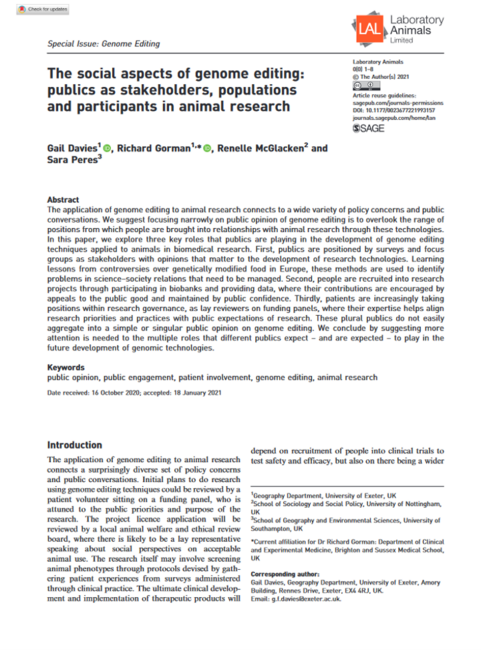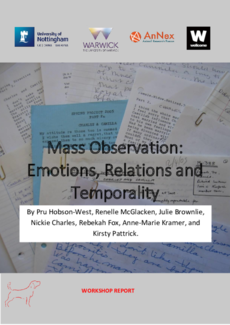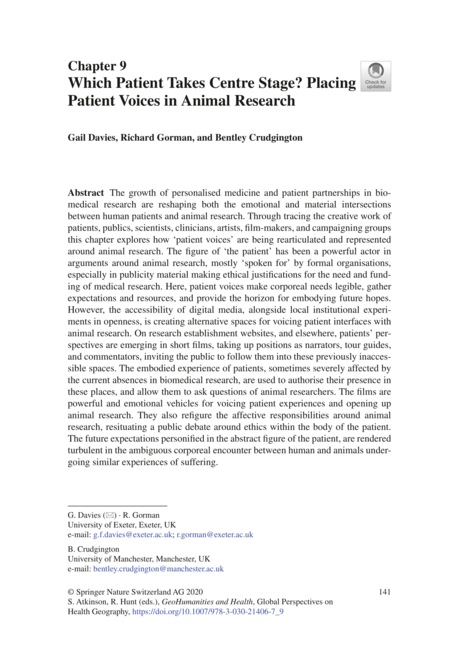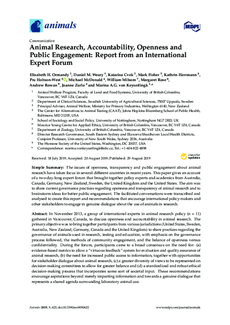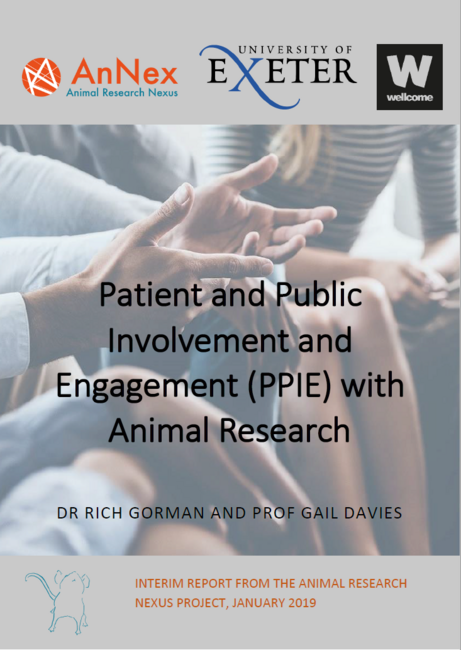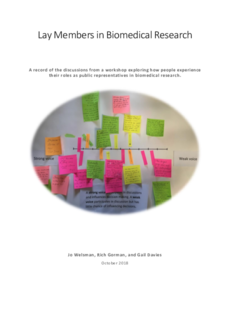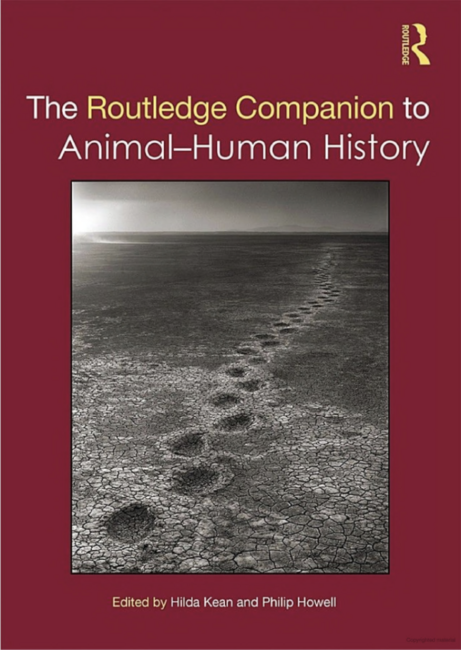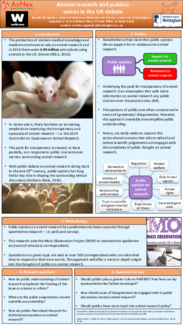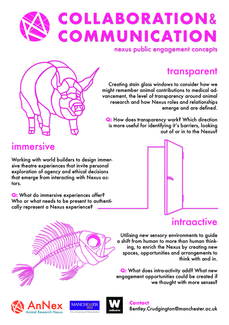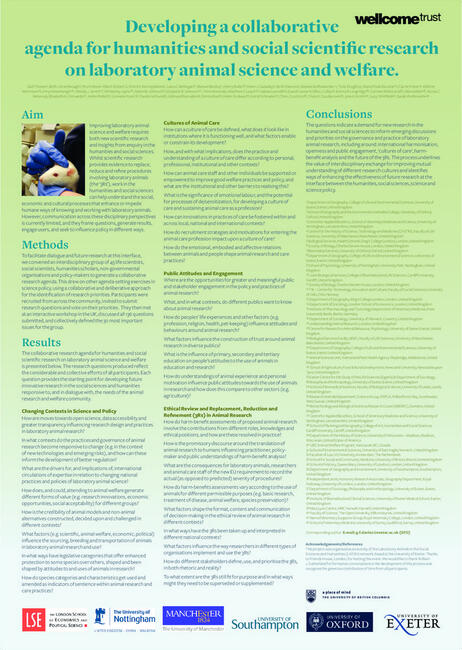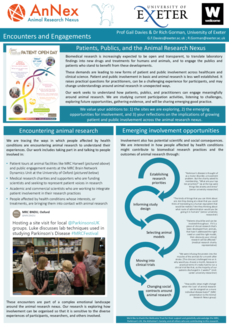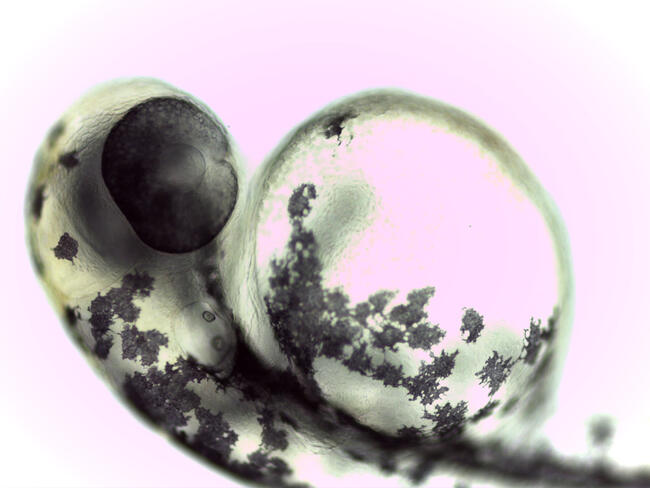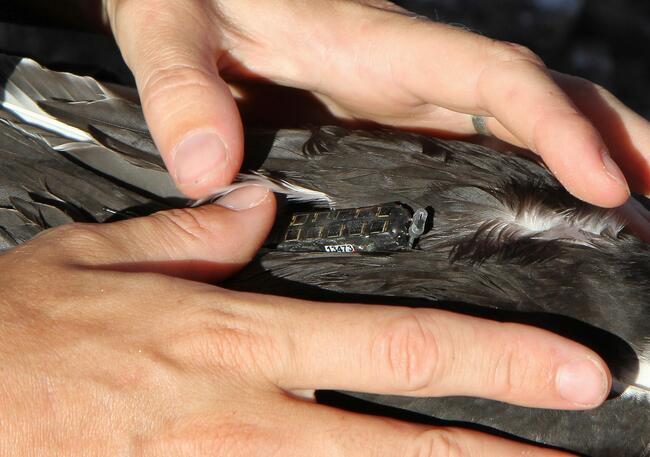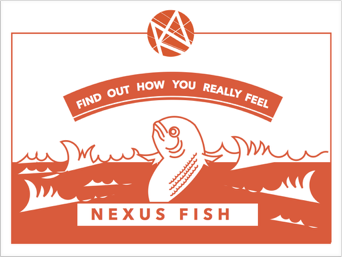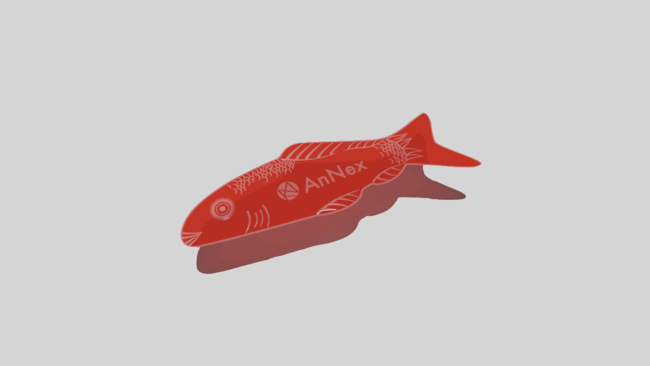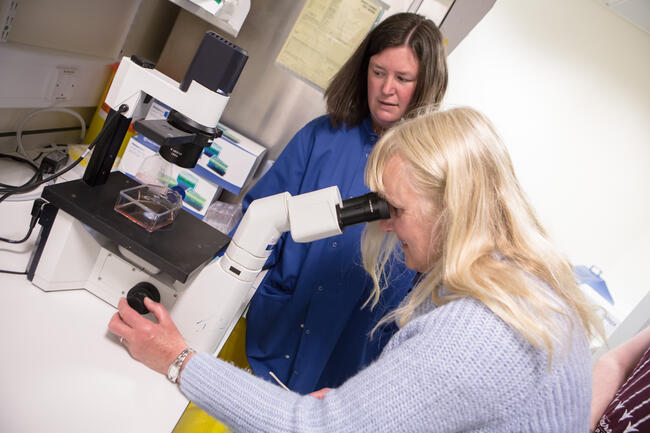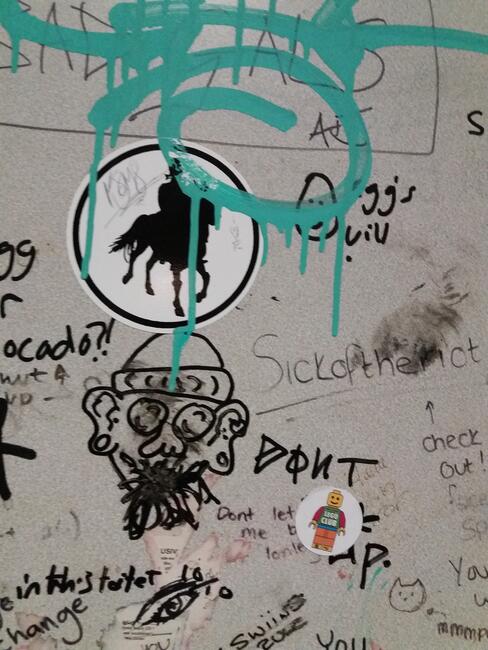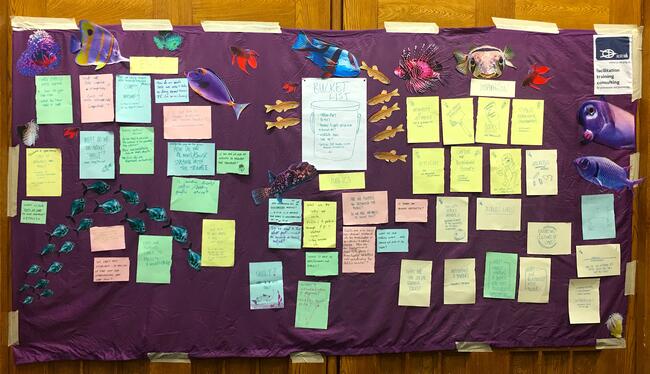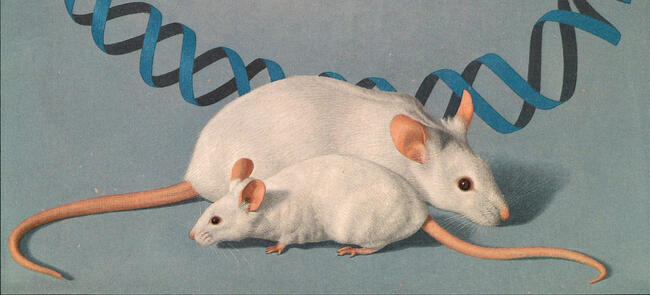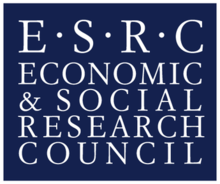Publics
Relevant, tagged site content:
Publications
In the UK, claims are often made that public support for animal research is stronger when such use is categorised as for medical purposes. Drawing on a qualitative analysis of writing from the Mass Observation Project, a national writing project documenting everyday life in Britain, this paper suggests that the necessity of using animals for medical research is not a given but understood relationally through interactions with inherent vulnerability. This paper stresses the ubiquity of ambivalence towards uses of animals for medical research, complicating what is meant by claims that such use is ‘acceptable’, and suggests that science-society dialogues on animal research should accommodate different modes of thinking about health. In demonstrating how understandings of health are bound up with ethical obligations to care for both human and non-human others, this paper reinforces the importance of interspecies relations in health and illness and in the socio-ethical dimensions of biomedicine.
This thesis explores how the topic of laboratory animal research is related to in everyday life in the UK, providing a sociological analysis of practices of knowing, caring, and constructing necessary biomedical uses of animals. In doing so, it develops the few qualitative studies of societal understandings of animal research, aiming to expand analyses in this area beyond measurement of polarised and static notions of acceptance or opposition. Instead, this thesis approaches understandings of animal research as relational and positional, emerging within particular yet shared social worlds which give the issue meaning in the everyday.
With an established history of controversy in the UK, the use of animals in science continues to generate significant socio-ethical discussion. Here, the figure of ‘the public’ plays a key role. However, dominant imaginaries of ‘the public’ have significant methodological and ethical problems. Examining these, this paper critiques three ways in which ‘the public’ is currently constructed in relation to animal research; namely as un- or mis-informed; homogenous; and holding fixed and extractable views. In considering an alternative to such imaginaries, we turn to the Mass Observation Project (MOP), a national life-writing project in the UK.
Animal research remains a practice marked by controversy and moral dilemma. However, UK science-society dialogues on the issue are increasingly managed via one-way transmissions of information which construct publics as passive and attribute their concerns to a lack of ‘correct’ knowledge. Challenging such assumptions, this paper questions how and why people actively manage their interactions with animal research through entangled practices of knowing and caring. Based on an analysis of writing from the UK Mass Observation Project, this paper explores difficulties and discomforts associated with animal research which can cause strategic withdrawals from engagements with the topic. In doing so, it extends existing concepts of ‘uncomfortable knowledge’ (Rayner) and ‘strategic ignorance’ (McGoey) to develop novel concepts of ‘uncomfortable’ and ‘strategic’ care. Finally, in examining desires to respond to animal research, I engage with Haraway’s notion of ‘response-ability’ to introduce the concepts of ‘responsive caring’ and ‘responsive knowing’.
The application of genome editing to animal research connects to a wide variety of policy concerns and public conversations. In this paper, we explore three key roles that publics are playing in the development of genome editing techniques applied to animals in biomedical research: as publics, as populations, and as participants.
The Mass Observation Project is in the care of the University of Sussex and based at The Keep in Brighton. It represents a unique repository of rich textual accounts which span the breadth of ‘everyday life’. These accounts are produced by the MOP’s voluntary correspondents, who are referred to as ‘Mass Observers’, and whose writings are guided by ‘Directives’ which entail a set of questions or prompts on a particular topic.
In Summer 2016, the University of Nottingham commissioned the first Directive on animal research, and analysis has now begun. In June 2019 Renelle McGlacken and Pru Hobson-West co-organised a workshop to critically consider some of the larger conceptual and methodological themes raised by the use of Mass Observation as a research tool, particularly (but not exclusively) when researching animals and interspecies relations.
We are delighted to share our report of the workshop and would welcome any feedback. Please feel free to share the report with your colleagues and wider networks.
Part of the Animal Research Nexus programme involves exploring the changing relationships between people affected by different health conditions and animal research. This chapter explores how ‘patient voices’ are represented around animal research.
The issues of openness, transparency and public engagement about animal research have taken focus in several different countries in recent years. This open access paper gives an account of a two-day-long, international expert forum on this topic.
This report discusses the different expectations people have of Patient and Public involvement and Engagement with animal research. We review the opportunities and challenges across perspectives. We also identify preliminary recommendations for enabling more meaningful involvement.
This report provides a record of the discussions at a workshop which brought together lay members from across the biomedical research sector to discuss the opportunities and challenges of shaping biomedical research.
The Routledge Companion to Animal-Human History provides an up-to-date guide for the historian working within the growing field of animal-human history. This book chapter by Rob Kirk suggests that to understand animal–human history we would do well to start with the role of animals in science.
This poster introduces work exploring how publics understand animal research using the written accounts of voluntary correspondents to the Mass Observation Project (MOP), which will seek to capture the sociocultural contexts that inform ethical and technoscientific judgements.
This poster presents through provocations from our public engagement approach, which seek to weave in new perspectives, allow new communities to form and meaningfully connect, so we may collaboratively face emerging challenges for science and society together.
Improving laboratory animal science and welfare involves many questions which social scientists and humanities scholars have researched, or have the capacity to inform. This paper outlines our “Collaborative Agenda for Future Humanities and Social Scientific Research on Laboratory Animal Science and
This poster explains our research exploring how patients, publics, and practitioners might engage meaningfully around animal researc and identifying how people affected by health conditions might contribute to the research practices that potentially involve animal research.
Events
How, why (and why not) are fish utilised as mascots in public engagement with animal research?
Have you ever thought about the role that animals play in producing new medicines? Want to try a creative way of thinking about this topic?
Citizen science is a fundamental contributor to wildlife research in the UK but its regulation can be complex.
For many, talking about animal research remains taboo. As a way of highlighting one of the roles that animal research plays, some have suggested labelling medicines as ‘tested on animals’. But is the act of labelling so simple?
Friday 28 September is European Researcher’s night, and for the fourth time Manchester Museum will be hosting Science Uncovered Manchester - a special late opening showcasing Manchester’s finest researchers and their work for an adult audience.
Blog entry
A lot of guidance has been written about how to actively involve patients and the public in clinical research, and evidence is growing about the value of this.
The Covid-19 pandemic has brought everyone’s attention to the simple practice of hand-washing - when to do it, and how to do it well.
How do publics talk about or reflect on animal research? Can animal research be considered part of everyday life? How can researchers use archives to understand engagement with sensitive topics?
On the 21st May, Pru Hobson-West and I dipped our toes into public engagement around animal research at the Nottingham Pint of Science Festival 2019.
Animal research is fraught with controversy, and dramatic debates around the use of animals in biomedical sciences keep flaring up.
Earlier this year, the MRC Brain Network Dynamic Unit invited lay members of local branches of Parkinson’s UK to visit the unit
In June 2018, several members of AnNex flew to the beautiful city of Vienna to take part in the 14th Congress of the European Society for Agricultural and Food Ethics (EurSafe) with a workshop on animal resear
The concept of openness is increasingly being used to drive change and shape debates around animal research. However, it is a complicated and nuanced concept, which can be both uniting and dividing in practice.
Announcements
The University of Nottingham as part of Midlands Graduate School is now inviting applications for an ESRC Doctoral Studentship in association with our collaborative partner, RSPCA, to commence in October 2019.
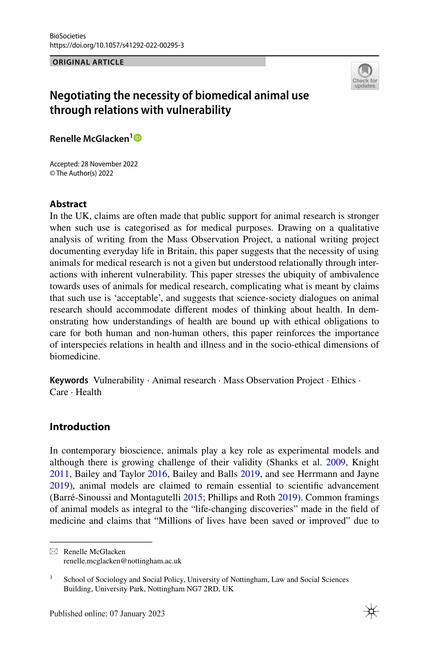
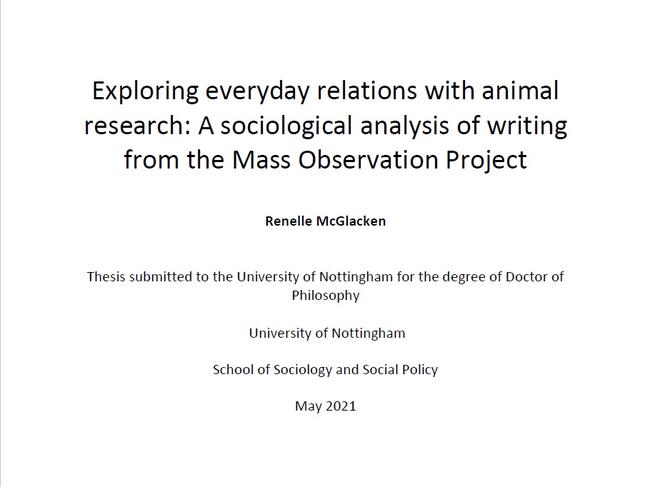
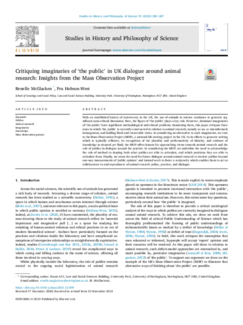
 Knowing and (Not) Caring About Animal Research_0.png%3Fitok=2jjq5NPu)
